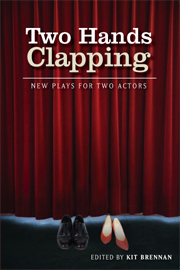
About the book
About the authors

Chris Craddock graduated from the University of Alberta’s BFA Acting Program in the spring of 1996. Since then, he has written or co-written over twenty plays for Fringe, Mainstage and TYA audiences, as well as two feature films, and three musicals, two of which received commercial productions in major cities. Some highlights include BASH’d: A Gay Rap Opera, which played three months off-Broadway and is the recipient of a GLAAD award; BoyGroove, which received a six-week commercial run in Toronto and a Dora Award; and 3…2…1, which toured to the Magnetic North Festival in Ottawa 2006. A bilingual feature film, The Pharmacist/La Pharmacien, written by and co-starring Craddock, is currently in audio post-production. Summer of My Amazing Luck was adapted from the novel of the same name by Miriam Toews. Chris’s solo show Moving Along has toured across Canada, including appearances in the 2005-2006 seasons of One Yellow Rabbit and Theatre Network. Chris has also worked as an Artistic Director, first of Azimuth Theatre 2001-2005 and then of Rapid Fire Theatre from 2005-2009.
Greg Nelson is the author of numerous radio plays. He spent a season as Writer/Story Editor on The Associates (CTV/Alliance Atlantis). Greg was recently the playwright-in-residence at Canadian Stage Company and Co-ordinating Script Editor for CBC Radio Drama. He lives in Toronto.
Mike McPhaden is a Toronto-based actor and playwright originally from Winnipeg. His play Poochwater won two Dora Mavor Moore Awards in 2003.
Nathan Cuckow is an Edmonton-based actor/producer/playwright. He is a co-founder of Edmonton's critically acclaimed, multi-Sterling-Award-winning, independent theatre collective, Kill Your Television Theatre.
Peter Boychuk is an actor, writer, director, and dramaturge who received his training from Studio 58 in Vancouver and Concordia University in Montreal. His play Fortunate Son was awarded the Stanley Mills Purchase Prize.
Rose Cullis is a writer/performer living and working in Toronto. She recently won an award from the Harold Greenburg Fund (Script Development Program) to develop a screenplay of Baal.
Ruth Lawrence is an actor and writer from St. Jacques, Fortune Bay, Newfoundland. She won the 2005 Rhonda Payne Award. Ruth is Artistic Associate at RCA Theatre in the LSPU Hall.
Sherry White is a screenwriter and actor based out of St. John's, Newfoundland. She most recently was seen in the series Hatching, Matching and Dispatching playing the character Myrna.
Kelley Jo Burke is an award-winning playwright and poet, a director, storyteller, documentarian, and broadcaster. Her plays and poetry have been produced and published in Canada and around the world.
Editor Kit Brennan is an award-winning playwright whose work has been seen across the country. She is a faculty member at Concordia University’s Theatre Department in Montreal, where she coordinates the undergraduate playwriting specialization.
About the editor
Editor Kit Brennan is an award-winning playwright whose work has been seen across the country. She is a faculty member at Concordia University’s Theatre Department in Montreal, where she coordinates the undergraduate playwriting specialization.
Excerpt
from Foreword
This collection came about out of curiosity and necessity. Curiosity: what's new across the country, how are others tackling the challenges and thrills of the form? Necessity: I teach a course at Concordia University called The Two-Hander, which (as you may suspect) is about writing a play for two actors. Many of the students who take this course have never written a play before, although the majority of them are studying theatre. They come to the course interested in finding out what it is like to create characters, tell a good story, and have their words come to life through the bodies of actors. They discover that first heart-stopping moment when their interior ideas become externalized and revealed through words, actions and events that they've sweated over and committed to paper, and on into the visceral immediacy of an audience's reaction to those very personal, and now public, ideas. That terrifying, exciting experience is a rich eye-opener for anyone who wants to make theatre, in any capacity, a part of their life.
For this book, I wanted a cross-country representation of previously unpublished scripts which included up and coming as well as established writers. A balanced mix of men and women — this in role distribution as much as in the writers themselves. I wanted full-length plays, and plays that are suited for festival or fringe time frames (thirty minutes to an hour). For teaching purposes, I needed a volume that was modestly priced with a healthy selection of scripts of varied styles, themes, and structures. Comedies as well as dramas. Social satire, fantasy, myth, storytelling. Different models of development and of production. Writers employing various angles or techniques: continuous action, intercutting of time and/or characters, actors portraying more than one character, historical events or persons as starting point or inspiration, clown, movement and dance.
Following each script, the writers talk about the work. I opened this up with a series of common questions, followed by a few more specific to the particulars of each play. They write about the initial spark of their idea, about particular structural choices such as how time works, how offstage characters function, if there's a time-lock or driving circumstance propelling the action, when and if it bends naturalism. Some of the writers are also actors, and they talk about writing work for themselves to perform. Two of the plays have been co-written — which is an interesting sidebar in itself, in a book of two-handers — so these writers discuss the process of writing with another person.
The obvious benefit of a play for two actors is that everyone is looking for a good one. They're rare gems, and highly producible. They're satisfying for audiences because you still retain the rich back and forth, the electricity, between actors. And they can be a wonderful journey for the actors because of the density of character arcs, the intensity of the experience.
I hope this collection may fill a gap, spark further productions, inspire writers, actors, designers, educators, producers and other theatre aficionados.
—Kit Brennan, editor








 Back to top
Back to top